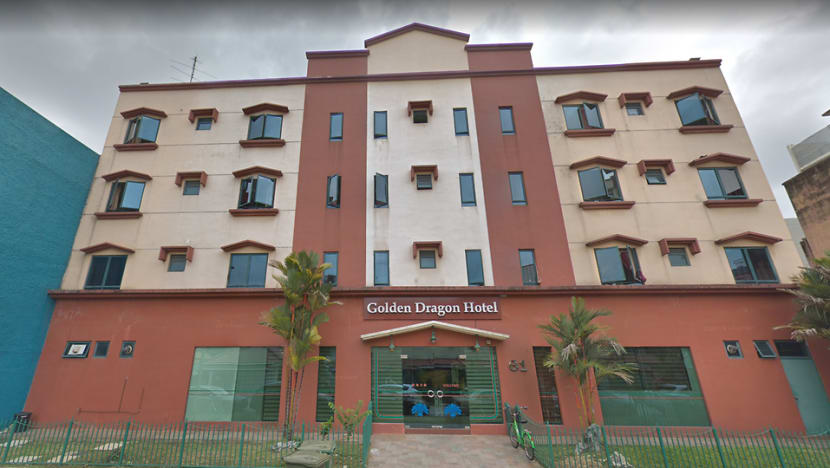Man facing death sentence for murdering girlfriend in Geylang hotel appeals against conviction

The woman was pronounced dead by paramedics at the scene. (Image: Screengrab from Google Maps)
SINGAPORE: A foreign worker who was sentenced to death in December for murdering his girlfriend in a Geylang hotel turned to the Court of Appeal on Tuesday (Oct 12), seeking to overturn his conviction.
Bangladeshi Ahmed Salim, 31, was convicted of killing an Indonesian maid after a tryst at the Golden Dragon Hotel on Dec 30, 2018.
Ahmed was betrothed to another woman at the time of the offence. He strangled 34-year-old Nurhidayati Wartono Surata with a towel after she refused to leave another man for him, before tying a rope around her neck in several knots and twisting her head forcefully.
She died of strangulation and a cervical spine injury, and her body was found by a hotel receptionist.
A High Court judge had found that Ahmed's actions before, during and after the killing demonstrated "premeditation, cogent planning and methodical execution".
On Tuesday, Ahmed's lawyers, led by Mr Eugene Thuraisingam, sought to have the conviction overturned and the murder charge downgraded to one without a mandatory death sentence.
Mr Thuraisingam, along with lawyers Chooi Jing Yen and Hamza Malik, said their case was that Ahmed took the life of the victim as he was "tormented by the idea that the woman he loved was seeing another man and leaving him for good".
THE DEFENCE'S ARGUMENT
The lawyers argued that Ahmed was driven in his actions by his adjustment disorder. It was directly caused by his relationship problems and gave him heartache, anxiety, jealousy and depression, making him "prone to impulsivity and violence", they said.
On the night of the murder, the victim was quarrelling with Ahmed about her new relationship and uttered humiliating words to him, the lawyers argued.
At trial, Ahmed had claimed that the victim told him: "He is better than you, he is better than you in the hotel, he is better in bed, he is better financially. If you don't believe, next week I will go with him, we'll make a video and show you."
However, the trial judge found that she did not say that, and that Ahmed had not mentioned such words in his multiple interviews with the police or with the Institute of Mental Health (IMH) psychiatrist.
Chief Justice Sundaresh Menon, who heard the appeal along with Justices Andrew Phang and Chao Hick Tin, told Mr Thuraisingam that the controversy was not whether Ahmed had adjustment disorder, but what effect this disorder had on Ahmed.
Justice Phang asked the defence what the evidence was showing that this impairment entitled Ahmed to the defence of diminished responsibility. For a defence of diminished responsibility to stand, the accused must be suffering from a specific abnormality of mind that substantially impaired his mental responsibility for causing the death.
Justice Phang pointed out that if, as the trial judge found, the murder was premeditated, then the defence's whole argument "is based on sand" and collapses.
Chief Justice Menon agreed and told the defence that "it's going to be very hard for you to dislodge the judge's finding that this was a premeditated plan".
"Your client wanted an outcome, and if he didn't get that outcome, he was already contemplating how to kill the victim," he said.
Justice Phang pointed to how the killing was carried out - with two strangulations and the deliberate tying of a rope "to ensure that the victim died".
He added that jealousy "cannot be an excuse".
The three-judge panel reserved their judgment and will issue their verdict at a later date.















